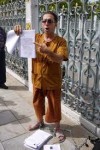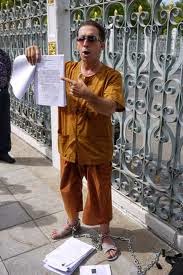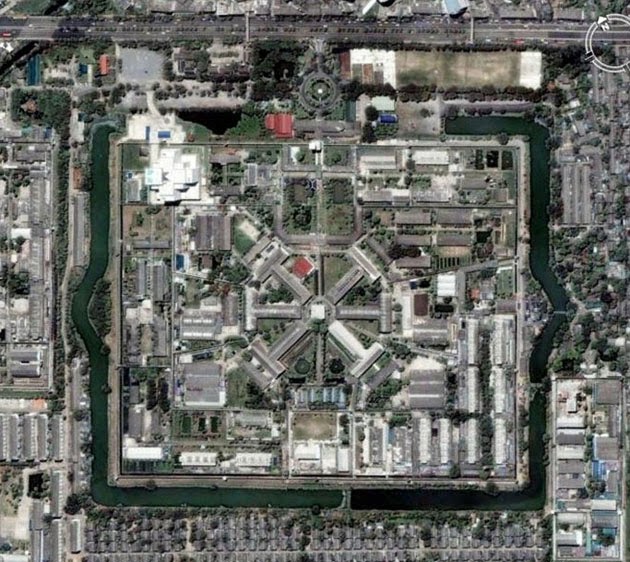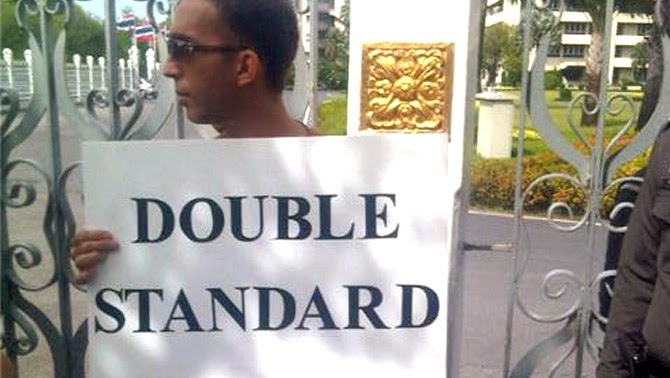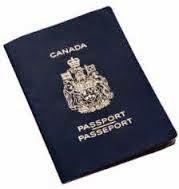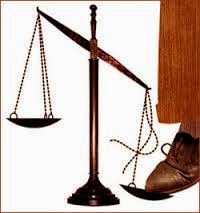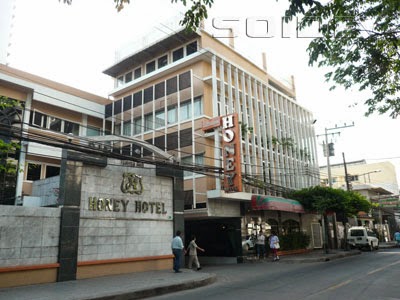Will the system get you in the end no matter what you do? One thing’s for sure this man will fight on.
Benny Moafi is a fighter and his story is incredible. He has been jailed for 21 years in Thailand for a crime – armed robbery – he says he did not commit. He went in fighting – and came out fighting nine years later.
The system is still trying to get Benny, an Iranian born Swede, and he is still fighting.
While in prison he graduated in law and went to fight on behalf of his fellow prisoners. He pursued some 200 cases. No surprise that various prison governors kept packing him off somewhere else.
He has campaigned legally against the Department of Corrections and his actions have resulted in the removing of chains from prisoners, the supplying of tooth paste and tooth brushes free, and even the reduction of the price of bananas in prison.
When he came out of prison having done his sentence he became the first person in living memory to demand a re-trial after serving his sentence and be granted it. He won at the Appeal Court.
But the system has got him back. Last month after the favourable decision by the lower court – the Supreme Court found him guilty again.
He would have been able to make a massive compensation claim for the years the Thai authorities took out of his life. Now his future is in the balance.
He has of course embarrassed Thailand on numerous occasions and exposed the country for clear breaches of international treaties regarding the treatment of prisoners. Now people know that behind the painted walls and manicured exterior gardens most Thai prisons are places where ‘humanity’ is not a byword.
Technically Benny could be deported – but he can’t while cases are being brought against him and he is bringing cases against others.
As for the armed robbery. That sounds dramatic. It was not. He was, he says, merely trying to help an Iranian couple who had paid a fortune for documentation to go t0 Canada to a Syrian only to find they had been scammed out of US$12,000. The couple and Benny took a policemen with them to demand their money back. The policeman subsequently said he had been warned off and declined to come to the trial or even admit knowing Benny.
Apparently police were backing the scammer. The details you can find below in a report by Dr. Danthong Breen, senior advisor to the Union of Civil Liberties and in the links.
Meanwhile Benny of course it taking nothing lying down – Watch this site for details.
The Strange Case of Benny Moafi
by Danthong Breen
Benny Behnam Moafi, a 45 year old Swedish citizen born in Iran, does not tolerate an injustice which uses the distortion of law to practice trickery and oppression.
Marrying a Thai woman in Sweden the couple in 1995 moved to Phuket where he appeared easy prey to corrupt officials in the police force and immigration office. They demanded a monthly protection fee and charged him of working without permission when he refused their extortion.
The Prosecutor dismissed the charges. Being a threat to extortion rackets on the island he was declared a Danger to National Security, and named as a Persona Non Grata. Fighting back, Benny made a formal complaint to the Ministry of Interior and Chief of Immigration in May 1997. The complaint was dismissed and he returned to Sweden for two years. Changing his name he returned to Thailand to dispose of assets he had been forced to abandon.
Benny’s hatred of injustice is such that he cannot tolerate that others are helpless in the face of cheating.
Meeting with an Iranian family who were charged several thousand US Dollars by a Syrian gangster who promised he could help them get a Canadian Visa, he called on the help of a Phuket Immigration Officer who had favored him in the past.
Benny acted as translator for the victimized family, coming to the hotel where negotiations between the victims, aided by the Phuket Officer, and the Syrian were held. He did not enter the hotel room but communicated by telephone and came to the hotel lobby and a stair way when the matter was settled.
The Syrian agreed to repay the fraudulent money but two days later reneged on the promise. When they asked the Phuket Immigration Officer, he told them that he had been told to stay away.
Then Benny advised the Iranian family who filed a formal complaint to the Thai Tourist Police on 4th September 2000. The high ranking Immigration officials with whom the Syrian was in collusion and knew Benny’s problem in Phuket Island urged the Syrian to complain to the Police Crime Suppression Division.
Next day the Iranian victims had left the hotel. The Syrian got to find the address of Benny and filed the complaint against Benny on 13th September 2000 and Benny was arrested at his apartment on 14th September 2000.
Police identified Benny to the Syrian as the interpreter, who now declared that Benny was one of those who had tried to extort money from him in that hotel room. The whole incident was changed to a crime scene and a case against Benny was fabricated, including charges that he had used a gun, a bat, a knife, and a bottle to threaten the Syrian.
At a time when his knowledge of the law and of the Thai language were inadequate Benny was charged and convicted, the only evidence being a photograph of the Syrian pointing at Benny as identification in the Police Station, Benny standing alone between a dozen policemen. Some details of the legal charges will follow in the final act of this drama, a decision of the Supreme Court of Thailand over 12 years later.
Benny was sentenced to imprisonment of 21 years and 14 months. Prison was the hard school where he studied Thai law and learned the cruel lessons of injustice relating to the Thai legal system and its penal code.
Over the years he perfected his knowledge of the Thai language, graduated in law through courses made available to prisoners by the Faculty of Law of Sukhothai Tammatirat University. But his real training in law was gained in the multiple cases which he fought for his fellow prisoners.
He relentlessly pursued the legal misdeeds of prison officials, and government, on one occasion taking legal action against the Prime Minister of the country and his cabinet.
As he entangled the administration of one prison in legal process he would be moved to another. He was moved between 10 prisons and some 30 different buildings. When finally he was released from prison after ten years, benefiting from remissions of sentence, and probably the wish of prison authorities to see the end of his legal trouble-making, he had almost two hundred legal cases in process.
He had perfected his legal knowledge and skills of court procedure, daring besides to challenge judges and prosecutors outside the mode of servility of most defendants and their legal advocates.
He emerged from prison, a legal gladiator, ready for the ultimate struggle of returning to his original case and its glaring injustices. The basis of his appeal was new evidence he had unearthed and the opportunity given to overturn judgment by Legal Act 5(3), 1983 called the Act of reviving a criminal case for new reconsideration, year B.E. 2526 (1983). His belief in his innocence gave him confidence, despite the fact that in the more than 30 years since the Act was issued, no successful challenge had ever been made to a legal judgment.
He began by challenging the judgment of the Court of First Instance and achieved reversal of sentence. He progressed to the Appeal Court where again a condemnation based on flimsy charge was reversed. Finally, he must achieve reversal of the judgment of the Supreme Court.
His experience of the easy reversal of judgment in the lower courts and the care with which he had prepared the presentation of new evidence regarding tampering with police records and testimony gathered by his lawyer from the Iranians involved in the dispute with the Syrian, made him confident of ultimate victory and a unique triumph in Thai justice which would be the first case of Thai history to receive a second trial.
The issuance of a Supreme Court decision on the 26th June of this year was a devastating blow. The Court confirmed the original offence, and dismissed all counter evidences as being irrelevant. In fact the lack of evidence for the Supreme Court decision is astonishing.
The events of the charge are the serious dispute said to have occurred in room 324 of Honey Hotel, Sukhumvit Road, Bangkok on 31st August 2000. But the floor cleaner sitting opposite the room 324 had given evidence that she well knew what a rumpus was caused by a serious dispute in a hotel room, but nothing was heard on the day of the supposed event.
Her negative testimony was confirmed by the service at the hotel lobby and the other people in the hotel who had confirmed that no one had ever known of such incident in that hotel till the police came to inform them.
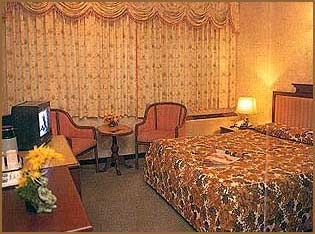
In addition, when the room was vacated the following morning there was no sign of any irregularity. The decision of the Supreme Court dismissed the testimony of the disinterested cleaner by saying that the room occupants could have tidied away all evidence of dispute before they left.
The testimony, reported from the Iranians who occupied the room confirming that Benny had not entered the room, gathered by the Thai lawyer who travelled to Iran to collect evidence, was dismissed as hearsay evidence.
The fact that neither gun nor bat nor knife nor bottle alleged to have been used by Benny were ever supported by any evidence was ignored and Benny was sentenced for the possession of a non existence gun.
Tampering with the police record of the case to match dates contained in the hotel register was passed over even though it appears on prosecution evidence and it caused the case to be divided to two different cases.
One being Benny sentenced to 6 people committing an armed robbery on 31st August 2000 and the other one is that 5 of his accomplices being accused of Extortion on 1st September 2000. There was reference to the statement of a security guard claiming that he had seen Benny mount the stairs to an upper floor and return later was repeated, although there was no refutation of Benny’s confirmation that he had mounted to a stair well but no further.
The sentence of 21 years for armed robbery and 14 months for a gun was confirmed on the single identification of a Syrian who put the blame on the only participant in the event who could be apprehended and who had no interest in the outcome other than providing the service of interpretation.
Benny Behnam Moafi declares that there has been a serious abuse of human rights, but ever the promoter of a just system, questions a law which has been in existence for over thirty years without a single successful application. In desperation he submits this case to public opinion and makes available the unacceptable High Court judgment which reveals the lack of basis for the conviction it reinstates.
THE SUPREME COURT JUDGMENT
No. 2234/2557 (2234/2014) Supreme Court
Date 6th March 2557 (2014)
Criminal Case
Prosecutor Officer, the Office of the Prosecutor General Plaintiff
Between Mr.Benny Behnam Jantharakul or Behnam Moafi Requestor
Mr.Benny Behnam Jantharakul or Behnam Moafi Defandant
Subject Armed Robbery, Extortion, Offenses against liberty, Offences against Gun Control Act, Misdemeanor (Bring a criminal case for reconsideration)
The petition against the judgment
Court of appeals Dated 6th July, B.E 2555 (2012)
Supreme Court Dated 19th June, B.E. 2556 (2013)
The lawsuit stemmed from Mr.Benny Behnam Jantharakul or Behnam Moafi, the Petitioner who is the Defendant in Case No. 12138/2543 (2000) Red No. 12158/2544 (2001) of the Court of first instance. The charges Is about Armed robbery, Extortion, Crimes against liberty, Offenses against the Firearms Act and Petty Offences. Court of First Instance sentenced the Defandant to 21 years 14 months imprisonment and ordered the Defandant to return the items or the price of the properties to the victim of an amount of THB 373,000.
Court of appeals dismissed the verdict and dropped all the charges. But then the Supreme Court judged to return back to the ruling of the court of first instance. The case was terminated. After that the Petitioner filed a petition to revive the case for reconsideration. He claimed that Police Officer Songsak Keawsuk , Petitioner’s friend is the eyewitness that the Petitioner never went to the room of crime scene and did not commit this crime.
Mr.Parviz, the wife of Mr.Parviz, Mr.Mohsen and Ms.Banafshe Moafi Who know Police Officer Songsak Keawsuk Witnessed and confirmed the matter. The closest witness to the incident is Ms. Nittaya Chomnok (Cholanop is the correct name) the maid working at Honey hotel Reception and the one who informed Mr.Mohsen of the room number and as a checker after Mr.Mohsen signed out of the room. The Petitioner complained to the Department of Special Investigation, Ministry of Justice so the testimonies of the new witnesses were gathered. The Petitioner requested the court to summon the witnesses and the evidences provided to summarize the case and take it Into consideration by bringin the case to a new trial.
The court of first instance checked the petition and ordered to dismiss the petition.
The Petitioner appealed the order.
The Court of Appeals considered and dismissed the order made by the Court of first instance and ordered the Court of first instance to proceed a trial and to make an opinion summary submitting it back to the Court of Appeals for its further decision.
The Court of first instance investigated the petition by proceeding a trial and made an opinion summary that the Petitioner’s petition has enough ground to bring the case for a reconsideration and a new judgment according to the Act of reviving a criminal case for new reconsideration, year B.E. 2526 (A.D.1983) Section 9.
The Court of Appeals granted the petition and ordered the Court of first instance to perform judicial reconsideration to revive the case by hearing for a new judgment according to the Act of reviving a criminal case for new reconsideration, year B.E. 2526 (A.D.1983), Section 10.
The Court of first instance proceeded the criminal court proceedings and made its comment according to the Act of reviving a criminal case for new reconsideration, year B.E. 2526 (A.D.1983), Section 13 (2) dismissing the petition of the Petitioner.
The Supreme Court had a meeting and ruled that at the last decision by The Supreme Court that even though the incident took place at night time but the scene of the incident was at a hotel room which would be lighting the Victim could see and talk closely with the Criminals for a long time. The Criminals did not conceal or disguise their faces and and when the Victim went to inform the Investigation officer about the identification of Criminals in detail and immediately, according to the testimony of the Victim, the Case Evidence no.19.
It means the Victim remembered the Criminals. Moreover, the victim is a merchant without any cause resentment against the Defendant before so there would be no reason for testifying against the defendant and incriminating the Defendant and his accomplices to to get a such penalty in a capital case. The Victim testified the events occurred at a step by step sequence and reasonable.
Although the testimony of other prosecution’s witnesses were somehow different but it is just trivialities. The defendant’s evidences and testimony has no ground. At the trial to revive the case for reconsideration, the Defendant brought the witness Ms.Bang Orn Cholanop the maid working at Honey hotel testified that Between 31st August to 1st September 2543 (2000) witness there was not any controversy or assault in the hotel. The guest in the room no. 324 terminated the lease on 1st September 2543 (2000) at 11 o’clock. Witness cleaned the room
and found no signs of damage or debris Or any fracture or fall in the room. Mr.Worasit Piriyawiboon, Defense attorney who traveled to Iran interrogated Mr.Parviz, the wife of Mr.Parviz, Mr.Mohsen and Ms.Banafshe Moafi Similarly, who gave testimony that around the month of June 2543 (2000) Mr.Parviz and the family contacted the Victim to help them acquire a visa traveling to the country of Canada and the United States.
They paid the Victim 12,000 U.S. dollars. Later on the Victim stated that he could not get the visa and he refused to pay the amount back till they agreed to meet for negotiations at the room number 324 at Honey hotel. While negotiations, Police Officer Songsak Keawsuk was at the scene and there was neither act of threat nor intimidation assault nor any weapon and nor any act of stealing any properties. There they agreed that the Victim would to repay back the amount taken. The Defendant was sitting at the hotel’s lobby and never entered the room no. 324. Mr.Pravit Chaibuadeng , the Special Cases investigator at the Department of Special Investigation testified as the witnesses that he questioned Police Officer Songsak Keawsuk who denied having joined the negotiations at the room no. 324 and . Mr.Pravit Chaibuadeng also questioned the victim who claimed that the Iranians extorted his money of 10 million baht which subsequently was negotiated down to 5,000,000 baht. He checked the investigation document and found out dubious points because the police daily book diaries and papers of the hotel were defaced. Police Lieutenant Wanchai Saiyud testified that according to the police daily book diaries document R.1 neither appear that any armed group were accused nor the victim appeared to have lost any property.
Defendant testified that Defendant requested Mr.Worasit to travel to Iran for questioning Mr.Parviz, the wife of Mr.Parviz, Mr.Mohsen and Ms.Banafshe. We see that Ms.Bang Orn , the cleaning staff was not at the scene of the incident and while on duty in the hotel did not hear any unusual sound. While the incident took place is at night time so the cleaning staff do not have to walk by the rooms In order to make the cleaning unless the guests request.
Above Benny Moafi on Thai Channel 3
The witnesses may not have heard unusual sounds out of the room 324. The witness did not testify as the guests in room 324 terminated the lease and left the next day and even the next day at approximately 11 o’clock the witness entered the room 324, she neither found any damage nor any broken items falling there.
It could be possible that the criminals cleaned the room completely to cover their crime. Mr.Worasit, the Defendant lawyer who interviewed the witnesses in Iran is only a hearsay witness. Moreover, the Group witnessed in Iran are charged with an offense with the defendant as accomplises, but fled the country before being arrested.
This group’s testimony should need to be listened carefully because they have a motive to testify in a way that makes their acquittal. As these witnesses testify in the same way that there was a negotiation with the Victim but there has not been any threatening or harming
And that the Defendant was not at the incident but he was waiting at the hotel’s lobby. However, the fact that the witnesses claimed that the witnesses contacted the Victim to make them a visa to travel to Canada and the United States.
But at the first trial, the witnesses of the Plaintiff and the Defendant testified that Mr.Parviz contacted the Victim to make them a fake passport to travel to Canada.
If so, these witnesses must have committed a crime too. About the Police Officer Songsak Keawsuk that the Defendant claims of being involved at the negotiations on the night of the incident did not come to testify at the trial according to the Act of reviving a criminal case for new reconsideration but he testified in the court just for the hearing of submitting the petition according to the Act of reviving a criminal case for new reconsideration and testified that he did not see the incident , does not know the Defendant and the Victim and has no involvement with the incident of this case.
At the time of the incident, he was on duty in Kanchanaburi. About Mr.Banleng Chanlawong the Security guard of Honey hotel at the first trial at the Court of first instance he testified that he saw the Defendant walking up the stairs to the room and saw the Defendant walkinging down from the upper floor.
At the hearing of submitting the petition according to the Act of reviving a criminal case for new reconsideration Mr. Banleng testified that he saw the Defendant walking in the hotel in a group of friends. This witness is not counted as new evidence.The Defendant did not bring him at the hearing of submitting the petition according to the Act of reviving a criminal case for new reconsideration.
However, this witness did not deny his testimony in past that he saw the defendant walking up the stairs going to the room and that he saw the Defendant coming down from above.
Moreover The Defendant have Mr.Pravit, the Special Cases investigator at the Department of Special Investigation testified that he investigated the case because of the defendant’s request that the originally investigation was suspicious. Police Lieutenant Wanchai Saiyud testified that he worked as the daily duty clerk at the Crime Suppression Division on 13th September 2543 (2000) and that in the Daily Record Document Evidence R.1 does not appear that the accused ones used any weapon and that the Victim did not lose any property.
But Police Lieutenant Wanchai Saiyud testified he wrote in the Daily Record Document Evidence as Police Lienteunant Colonel Sawai or Pong Sawai the Investigation officer told him as he Prepared the testimony from the Victim ,document J.19 and then when it was finished, brought it to him to write by saying. But the testimony from the Victim,document J.19 has the details of using weapon to threaten the Victim and the Victim had lost his Thai banknotes, U.S. banknotes and diamonds.
The police daily book diaries are just a brief record of what happened and may not show all details. Anyhow, the police daily book diaries document R.1 stated the use of force by the criminals against the Victim to force him hand over the money and property that the Victim has brought with him. It is sufficient to note the circumstances of the case in brief. There is no doubt and dubious. Plaintiff’s evidences has the Victim’s testimony as the eyewitness that the Defendant accomplished with others to commit the crime.
There are circumstantial surrounding witnesses certifying that while the crime took place, the Defendant appeared in the area of Honey hotel and was together with the criminals.
There is a steady weight on the evidences from the Plaintiff. There are no grounds for the Defendants’ new evidences at the stage of reviving a criminal case for new reconsideration to be able to refute the plaintiff’s evidences. The fact is the same as the Supreme Court decided before that the Defendant is the co-offender of the crime.
Sentence to drop the request.
Mr. Jiraniti Havanon
Mr. Pornthep Ampornklingkeaw
Mr. Pisit Sudlapa
THE WEBSITE OF RECORD
 In addition, when the room was vacated the following morning there was no sign of any irregularity. The decision of the Supreme Court dismissed the testimony of the disinterested cleaner by saying that the room occupants could have tidied away all evidence of dispute before they left.
In addition, when the room was vacated the following morning there was no sign of any irregularity. The decision of the Supreme Court dismissed the testimony of the disinterested cleaner by saying that the room occupants could have tidied away all evidence of dispute before they left.
